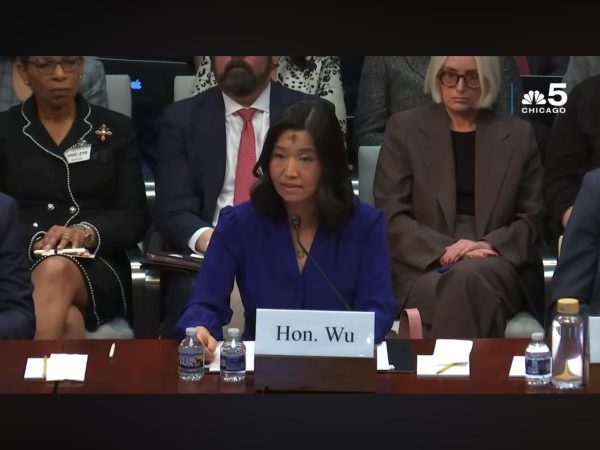People over Politics and Profit: Why the EPA’s new policy on animal testing is a threat to public health
Photo via Wikimedia Commons under Creative Commons license
Technician working with three black mice in a cage.
In September of 2019, the EPA began moving away from animal testing and instead started looking for other alternatives, setting an ambitious goal of eliminating animal testing by 2035. An administrator for the EPA stated, “We can protect human health and the environment by using cutting-edge, ethically sound science in our decision-making that efficiently and cost-effectively evaluates potential effects without animal testing, The consequences of these actions are going to have devastating effects on our nation, especially its public health. Considering two of the EPAs main purposes as stated by their website are, “Americans have clean air, land, and water” and “Chemicals in the marketplace are reviewed for safety,” this ban on animal testing is going to be violating the central tenets of the organization.
Many might see this as a positive move because animal testing is often considered to be immoral and unethical. Anyone with a heart is affected watching or hearing terrible descriptions of how some animals are tortured and murdered in seemingly cruel and pointless experiments, but it comes down to a matter of necessity. According to the National Center for Biotechnology Information, Polio, one of the worst scourges of the early 1900s, killing and crippling thousands of children every year was ended by testing on rhesus monkeys that helped discover a cure. Another example from the NCBI where animal testing proved vital to the development of modern medicine was transplanting, “Through a systematic study of the surface immune markers of specially bred strains of mice, Snell and Benacerraf provided the basis for much of the understanding that has led to the success of organ transplantation”. Science has been advanced by animal testing and as a result, it has improved public health.
On the other side of the debate, animal rights groups are ecstatic at the EPA’s new policy, seeing it as the fruition of all their hard work. Footage of animals being mistreated in laboratories seems to justify the support of the EPA’s new policy. What people don’t realize is that when they are supporting such actions is that they are making a deal with the devil. One of the strongest supporters of banning animal testing is the American Chemical Council, a trade association for chemical companies. This organization has tried to fight bans on plastic bags, and prevent attempts to ban chemicals known to be harmful to humans like Formaldehyde. The organization wants to see as little information as possible about the potential harms of their products revealed to the public. This will only make it harder for the government to regulate potentially harmful substances to humans. A world where conglomerations of corporations work together to influence the government to promote their business is not one any supporter of democracy should want to live in.
Furthermore, advocates against animal testing often claim that there are alternatives, such as Petri dishes and simulations. They also claim that tests on animals are quite ineffective, merely working 25% of the time. Yet, none of the alternatives have been proven to be as effective. Studying the effects of chemicals on cells does not demonstrate how it will affect the function nor harm an organism as a whole. Some dangers in table chemicals haven’t even been discovered until they were tested in actual organisms, because of reactions that happen in the organism’s metabolism as a result of the chemical. Professor Aaron Bowman, the head of Purdue University’s School of Health Science said, “The new testing methods may not capture fully all of the human physiology, So animal models help us avoid missing something unexpected and dangerous.” These are not replicated merely in cells. According to one Time Magazine article, exposure to dangerous substances has prematurely killed more than 30,000 Americans since 1990, reducing our national life expectancy by 15 years. Setting an arbitrary deadline for the EPA to end animal testing will cause immediate and long term harm to Americans. This is an example of politics superseding science.
This movement has created an unlikely alliance between chemical companies, those that typically support fewer environmental regulations, and animal rights activists. Driven by Andrew Wheeler, the Trump-appointed EPA director who worked as a pro-coal industry lobbyist, the pure motivations that started the movement have become quite murky in our current political climate. He has worked to decrease regulations of companies and both humans and our environment will suffer as a result. This latest policy change’s motivations need to be looked at even deeper than any other, and any changes in conduct by the EPA eyed with suspicion of their true motives.
No one wants to see animals suffer, but no one wants to develop cancer. Currently, the only option for truly understanding the harmful effects of chemicals on humans is animal testing. There are no as effective alternatives, nor as efficient at finding cures to diseases and seeing how potentially harmful substances and chemicals affect humans. Mrs. Pernice, a science teacher at Hamilton-Wenham Regional high school weighed in on the importance of animal testing, “There’s a lot of medicine that has been produced because of animal testing, for example, the Polio vaccine.”
The EPA’s arbitrary deadline is going to hurt scientific development, public knowledge, and ultimately public health. We must decide that the influence of corporations and their desire for profits should be left out of our government’s decisions, and to put the health and wellbeing of the American people first.
Matt Dearborn is a senior at the High School and is a staff writer for the General Consensus. This is his first year writing for the paper and he plans...







